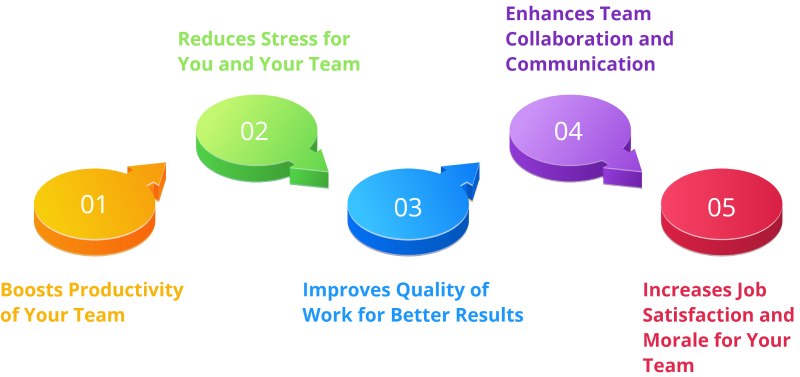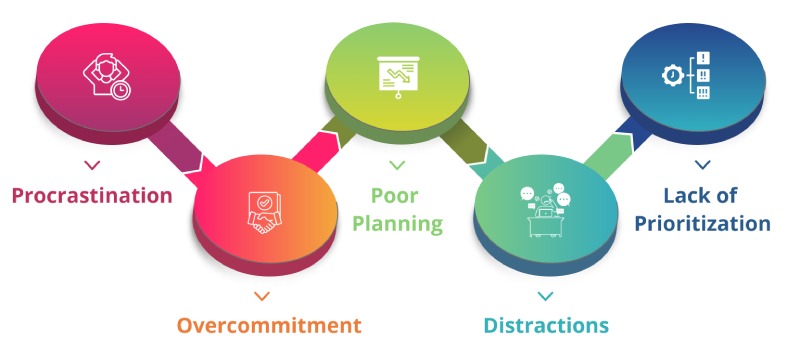Are you constantly racing against the clock to complete tasks, attend meetings, and manage your team? Time management is one of the most crucial skills a manager should possess to ensure the team is productive and not stressed out. Here, you will find out about the main challenges of time management, the advantages of time management, and the tips to manage time effectively. Uncover how to increase your productivity and decrease your stress levels through better time management practices.
What is Time Management?
Time management is the process of organizing and prioritizing the amount of time available to complete work and other activities. For a manager, it means planning and organizing in a way that all the activities operate effortlessly. It is not about counting hours but about selecting what is important, eliminating the time-killing activities and making you and your team effective. Time management is important so that work is done within the required time, the productivity of the team is not affected and stress is minimized. In other words, it’s about working smarter, not harder.
Advantages of Effective Time Management at Work:

Let’s see the advantages of effective time management.
1. Boosts Productivity of Your Team:
When the time is organized properly, your team can achieve more within the shortest time possible. Time management techniques make it easier to plan tasks and make sure that everyone is aware of what is expected of them. In this way, your team will not be interrupted by unimportant things and will be able to work more efficiently.
2. Reduces Stress for You and Your Team:
This is because when time is well managed, there is less stress for all the people involved. When you have a clear schedule and priorities, you and your team can work more calmly, knowing exactly what needs to be done and when. This eliminates last minute rush and ensures that everyone is calm and composed.
3. Improves Quality of Work for Better Results:
Effective time management enables your team to focus more on their work. When you are not under pressure, they can be able to work carefully and come up with quality work. This results in improved outcomes and reduced errors, which in turn increases the value of your team’s work.
4. Increases Job Satisfaction and Morale for Your Team:
When your team is able to control time, they have a feeling of control over the work and hence can be able to manage it. This is because your team members feel valued and appreciated when their time is respected, which boosts their job satisfaction and makes them happier and more motivated in their positions.
Common Time Management Challenges You Might Encounter at Workplace:

Following are the common time management challenges you might encounter.
1. Procrastination:
Procrastination is something that is common with most individuals at some point in their lives. When you delay, you may feel pressured and hurried as deadlines approach. To reduce this stress, begin working on tasks at the earliest opportunity and attempt to break them down into smaller tasks. This approach helps you to avoid procrastination and the stress that is associated with working at the last minute.
2. Overcommitment:
While it is easy to agree to every project and meeting, one must be careful not to overwork themselves. If you overload yourself, it becomes difficult to devote your time and energy to each task as it should be. Learn how to decline and set boundaries for yourself and your schedule. It is perfectly alright to say no or to delegate some tasks to focus on the priorities.
3. Lack of Planning:
If there is no plan in place, it becomes very difficult to know what has to be done next. Lack of planning results in time wastage and disorganization of work. Spend a few minutes to develop a precise and comprehensive plan. Organize your day or week with the help of calendars or to-do lists to make sure you do not forget about anything important.
4. Distractions:
Distractions are present in today’s world, and they include social media, emails, and other interruptions that make it difficult to concentrate. To avoid such interferences, it is recommended to allocate a certain time for reading emails and messages and organize the working space. You should also encourage your team to do the same to improve the general productivity of the team.
5. Lack of Prioritization:
When everything is urgent, it becomes challenging to identify where to start. If you do not prioritize, you may end up doing things that are not very important at the moment. Organize work and concentrate on high-priority activities. There are tools like the Eisenhower Matrix that can help decide what needs to be done now and what can wait.
Effects of Poor Time Management at Work:
Now let’s explore the effects of poor time management.
1. Increased Stress:
When you fail to manage your time well, you end up with too many things to do and you are always multitasking. This can quickly result in stress and the feeling of being overwhelmed. If you manage your time more effectively, you will be able to reduce stress and achieve a better work-life balance.
2. Missed Deadlines:
Lack of a plan means you can easily fail to meet set goals and deadlines. This can cause project delays and poor performance among team members. Thus, by setting deadlines and following the schedule, you can ensure that critical tasks will be accomplished on time.
3. Reduced Productivity:
Lack of time management means you are not as productive as you should be. You could procrastinate, spend a lot of time on irrelevant activities, or get distracted often. There are ways to improve how you plan and organize to achieve more.
4. Lower Quality of Work:
When you are short on time to complete a task due to a lack of proper time management, the quality of the work done is usually compromised. Proper scheduling and management of tasks are effective and reduce the chances of making errors.
5. Strained Relationships:
Delays and working to the last minute are not good for your team or clients. Effective time management ensures that you meet your commitments and foster good relations, which is essential for morale and customer relations.
6. Missed Opportunities:
If you are always behind in your work, you may be missing out on opportunities for growth or learning. Time management enables you to be more proactive and grab chances that are available in your life.
10 Essential Time Management Tips for Maximizing Productivity at Work
Following are the essential time management tips.
1. Prioritize Tasks Using the Eisenhower Matrix:
Start by categorizing tasks into four groups: These are the four quadrants of tasks: urgent and important, important but not urgent, urgent but not important, and not important and not urgent. Focus on the things that matter and avoid getting distracted by things that do not matter much.
2. Set Clear, Achievable Goals:
Define your goals and make sure that they are specific, measurable, achievable, relevant, and time-bound (SMART). Specific goals give your team focus and help in assessing the level of achievement.
3. Use a Time Blocking Technique:
Schedule specific activities or kinds of work for certain periods.This time blocking method helps in establishing an organized timetable and ensures that tasks do not take longer than required.
4. Employ the Pomodoro Technique:
The Pomodoro technique is a time management technique where work is done in short, focused sessions of 25 minutes with a 5-minute break in between. This method enhances focus and prevents exhaustion by dividing tasks into smaller chunks of time.
5. Limit Distractions:
Determine what usually interferes with your and your team’s focus, for example, notifications or noisy environments, and avoid them. A cluttered environment hinders productivity and efficiency, and therefore, a focused environment is ideal.
Also Read: How to Manage Work from Home Distractions
6. Delegate Tasks When Possible:
Motivate your team by assigning tasks that are in line with their skills and expertise. Delegation not only makes your work easier but also assists in the growth of the team and collaboration.
7. Use Time Management Tools:
Employ calendars, checklists, or time management software to record tasks, deadlines, and productivity. These tools help in tracking things and ensure that there is no way that something will fall through the cracks.
8. Establish a Routine:
Create a schedule that you should follow every day and ensure that it includes time for work and other activities. It also assists in the management of work-life balance since a consistent routine enhances productivity.
9. Review and Adjust Regularly:
It is important to review the time management strategies that have been put in place and modify them periodically. This approach makes it easier to identify what is effective, what is ineffective, and how to improve the process.
10. Avoid Multitasking:
Minimize multitasking as it reduces the quality of work and productivity. While multitasking is counterproductive and increases the likelihood of errors, single tasking is efficient and less stressful.
Time Champ: The Ultimate Tool for Mastering Time Tracking and Management
Hey managers! In search of a revolution in time management? Welcome Time Champ, the new time management solution that will help you organize your time and tasks.
Time Champ helps you stay on track with time tracking and prioritization. It also assists in optimizing your work process since it shows how time is being utilized and where it may be stuck.
Just imagine being able to have a clear vision of your team’s work and efficiency. Time Champ identifies tasks that are likely to take more time than expected and helps in the management of time.
The best part? Time Champ is very simple to use and can be easily incorporated with other tools that you are already using to set schedules, track progress, and boost productivity.
Time Champ is the ultimate tool for time management and organization of your workday. It is the best tool that can be used in managing time effectively.
Conclusion:
It is important to know how to manage time properly to increase efficiency and decrease stress. Some of the problems that can be solved include procrastination, over-commitment, and distractions, which will help in improving the working conditions. Some of the best practices include time management, setting goals, and prioritizing tasks for yourself and your team to ensure productivity is improved. Optimize your strategies and be adaptable to increase efficiency and staff morale.
Boost your time management at Work with Time Champ
Try now for greater productivity and efficiency!
Signup for FreeBook DemoTime management is the process of organizing and scheduling the use of time in order to achieve intended goals. For managers, it is about making sure that the team is effective, satisfied and productive by eliminating non-value added activities.
Some of the common issues that employees experience include procrastination, overcommitment, no planning, distractions, and poor prioritization. These challenges can affect productivity and cause stress if proper time management measures are not put in place.
Time management enhances the efficiency of the team, decreases stress levels, increases the quality of work, and enhances the morale of the workers. When the tasks are organized and priorities are set, the team is able to perform better and get more done.
Poor time management leads to stress, lateness, low productivity, poor quality work, strained interpersonal relations, and lost opportunities. It can have a negative impact on the performance of the individual and the team as well.
Some of the time management techniques include the Eisenhower Matrix, goal setting, time boxing, and the Pomodoro Technique, avoiding distractions, delegation, time management tools, time management routines, and time management audits.






